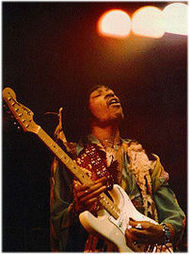He sits at the dinner table devouring Nordic-sized portions of food. The plumbing in his ravaged body groans under the load. Kristen smiles, the big toothpaste grin the photographers ate up in Paris. Now the smile is only for him, sitting together with her family in her mother’s home in Copenhagen.

His muse had failed him at the Isle of Wight. The long fingers, beloved of the gods, failed him as the fog and chill engulfed the stage. The rioters were carrying on out there, somewhere in the dark. He couldn’t see them, but he heard them tearing down the fences. The tempo of chaos, the chill of an island somewhere off of England, his physical breakdown, they were all coalescing. Even Red House eluded him, the slow blues that was always money in the bank.
Two days later, in Arhus, he collapsed in the dressing room. He was sick. He was exhausted. He asked for cocaine. They had none. He didn’t return to the stage, and a tiny silver plane transported them from Arhus to Copenhagen, Kirsten gripping his enormous hand. They checked into the airport hotel, he lit a joint, but she had an idea. She decided take him home, to mother Birthe Nefer’s house, for solace and home cooking, Danish style.
He fell asleep on the big upstairs bed. He slept so seldom these days. And now Birthe feeds him, and he smiles, boiled meat and potato dumplings wending their way into his dark, emaciated, body.
He looks around suddenly. “What is this?” he asks, incredulous. He looks at brothers and sisters and parents all surrounding him in this country kitchen in Denmark. The serenity, the sheer fact of total acceptance, is jarring. “I can’t believe this,” he says, looking around at smiling faces. “Why are you so good to each other?” Kirsten Nefer smiles, and tears up. She realizes that never before, not one time in his short and utterly unique life, has Jimi Hendrix ever sat at a table with a family eating dinner. Eighteen days later, he will be dead in Monika Danneman’s apartment in London.
To ride the Dionysian instrument further than it has ever gone. To be not merely famous but beloved, and to be not merely beloved but iconic. To become permanent. To become a meaning, not a man. People dream of such things, sitting at the table.
Meanwhile, Jimi dreams of sitting at the table.
Two days later, in Arhus, he collapsed in the dressing room. He was sick. He was exhausted. He asked for cocaine. They had none. He didn’t return to the stage, and a tiny silver plane transported them from Arhus to Copenhagen, Kirsten gripping his enormous hand. They checked into the airport hotel, he lit a joint, but she had an idea. She decided take him home, to mother Birthe Nefer’s house, for solace and home cooking, Danish style.
He fell asleep on the big upstairs bed. He slept so seldom these days. And now Birthe feeds him, and he smiles, boiled meat and potato dumplings wending their way into his dark, emaciated, body.
He looks around suddenly. “What is this?” he asks, incredulous. He looks at brothers and sisters and parents all surrounding him in this country kitchen in Denmark. The serenity, the sheer fact of total acceptance, is jarring. “I can’t believe this,” he says, looking around at smiling faces. “Why are you so good to each other?” Kirsten Nefer smiles, and tears up. She realizes that never before, not one time in his short and utterly unique life, has Jimi Hendrix ever sat at a table with a family eating dinner. Eighteen days later, he will be dead in Monika Danneman’s apartment in London.
To ride the Dionysian instrument further than it has ever gone. To be not merely famous but beloved, and to be not merely beloved but iconic. To become permanent. To become a meaning, not a man. People dream of such things, sitting at the table.
Meanwhile, Jimi dreams of sitting at the table.
 RSS Feed
RSS Feed